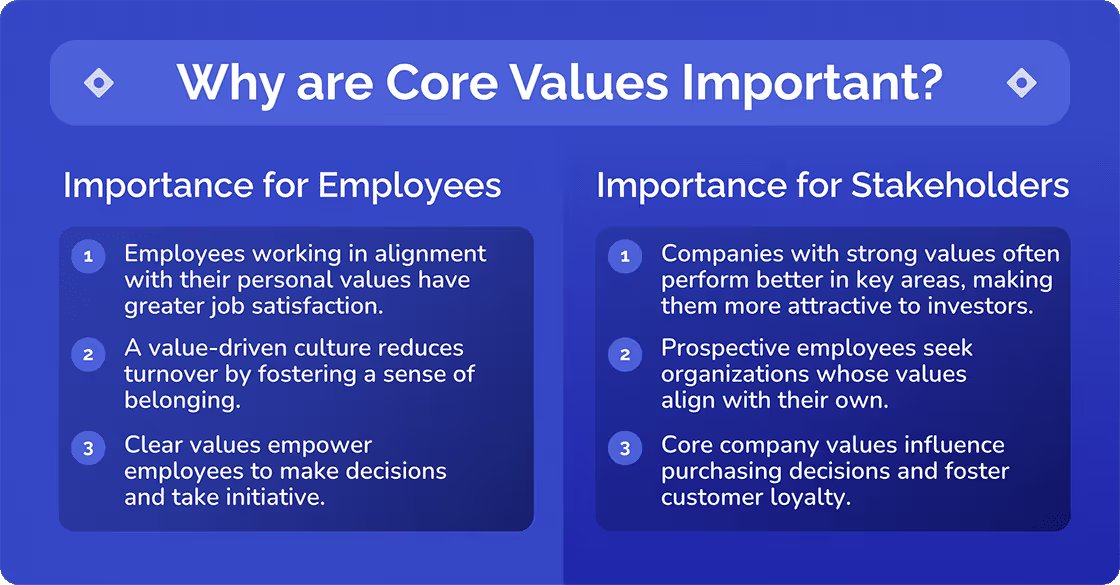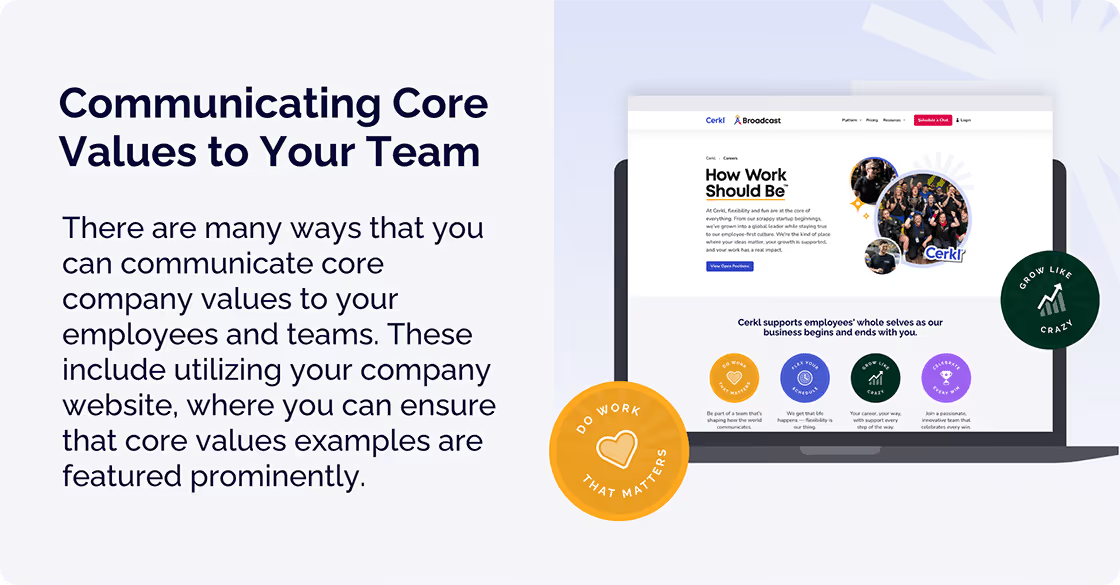Company Core Values: What They Are & Why They Drive Results
Discover what company core values are, why they matter, and how 11 top organizations use them to shape culture and drive results.

.avif)
The Importance of Internal Communication
Effective internal communication is the backbone of every successful organization. Learn the ins and outs of internal communications with our research-backed white paper.
Access Now →Fast Facts About Company Core Values
- Core values define your company’s identity. They articulate what your business stands for, serving as a constant across evolving strategies, teams, and leadership. These values shape expectations and help employees understand how to act, decide, and collaborate.
- They shape culture and decision-making. Whether it’s hiring, onboarding, customer service, or crisis response, core values provide a consistent filter for making aligned and principled choices throughout the organization.
- Employees want value-driven workplaces. People want to work for companies that reflect what they care about. A clearly defined set of core values strengthens purpose and gives employees a reason to stay, contribute, and grow.
- Strong values build trust and loyalty. Core values foster alignment and engagement internally and strengthen brand reputation, customer connection, and stakeholder confidence externally.
- They support long-term success and adaptability. Value-focused organizations are more resilient during change and more capable of maintaining a clear direction in times of uncertainty.
- In today's dynamic business landscape, company core values have transcended from being mere statements that companies display proudly on their walls. Instead, they have become strategic imperatives that shape organizational culture, influence decision-making, and drive long-term success.

A multinational professional services network and one of the world’s Big Four accounting firms, Deloitte has long promoted the strategic value of core beliefs and a distinct workplace culture. The company’s 2025 Global Human Capital Trends report highlights that as work becomes more boundaryless, uniquely human capabilities like empathy and curiosity become increasingly vital. The report emphasizes that to thrive in this new landscape, organizations must embed these human strengths into their operating models - and that begins with clearly defined core company values.
Deloitte notes that value-driven organizations are better positioned to foster belonging, support well-being, and build trust across increasingly distributed teams. In a time when adaptability, collaboration, and purpose matter more than ever, core values serve as cultural anchors that keep companies focused, connected, and resilient.
Key statistics from the 2025 report underscore the importance of company core values in today's dynamic work environment:
- 74% of workers, managers, and executives surveyed believe it is very or critically important to prioritize human capabilities such as empathy and curiosity.
- About 75% of workers expressed a need for greater stability at work in the future.
- 52% of leaders view the potential value of deeper human and machine collaboration as very or critically important.
- 73% of organizations recognize the importance of reinventing the role of the manager, yet only 7% report making significant progress in this area.
- More than 70% of managers and workers are more likely to join and stay with an organization if its employee value proposition helps them thrive in an AI-driven world.
But what exactly are company core values?
What are Company Core Values
Company core values are the fundamental beliefs and guiding principles that shape an organization's culture, behavior, and decision-making. They serve as a compass, directing how employees interact, how leaders make decisions, and how the company engages with stakeholders. These values are often reflected in a company's mission statement and influence its overall direction and reputation.
Guiding Principles
Core values are not mere buzzwords to be displayed on company walls. They are the principles that drive a company's actions and decisions. They provide a consistent framework that informs behavior and decision-making across all levels of the organization.
Foundation for Culture
They form the bedrock of a company's culture, shaping how employees interact and how the company operates. A strong set of core company values fosters a cohesive and positive work environment.
Distinction from Other Values
While core company values are fundamental and unchanging, other values like mission and vision statements can evolve. Core values remain constant, providing stability amidst change.
Essential for Growth
Strong core company values help companies foster a sense of shared purpose, improve employee retention, and drive long-term success. They are integral to building a resilient and adaptable organization.
Free Internal Communications White Paper to Improve ROI
Turn your internal communications strategy around today

Download Free
Why are Core Values Important
Clear core values ensure everyone in an organization, including employees and stakeholders, is aligned around a shared purpose and direction, fostering a sense of unity. This alignment enhances collaboration and efficiency.
Consistent adherence to core company values builds trust among employees, customers, and stakeholders. Trust is a cornerstone of effective relationships and organizational success. Furthermore, core company values provide a framework for making difficult decisions and navigating complex situations. They serve as a touchstone for evaluating options and determining the best course of action. They also define the kind of behavior a company expects and promotes, fostering a positive and productive work environment. A strong culture attracts and retains top talent.
Above all else, company core values contribute to a company's overall reputation and brand image, attracting customers and talent. They signal what the company stands for and its commitment to ethical practices.
Importance for Employees
For employees, core values are important because they enhance job satisfaction, increase retention rates, make employees feel empowered, and enhance employee engagement.
- Employees who work in environments aligned with their personal values experience greater job satisfaction. This alignment leads to increased motivation and engagement.
- A value-driven culture reduces turnover by fostering a sense of belonging and purpose. Employees are more likely to stay with organizations that reflect their values.
- When core values are clearly communicated and embodied, employees feel empowered to make decisions and take initiative, leading to higher engagement levels.
Importance for the Stakeholders
Company core values impact the full spectrum of stakeholders including investors, new hires, and customers. This is because:
- Investors are increasingly considering environmental, social, and governance (ESG) factors in their decisions. Companies with strong core values often perform better in these areas, making them more attractive to investors.
- Prospective employees seek organizations whose values align with their own. Clearly articulated core values can attract top talent and improve recruitment outcomes.
- Customers are more likely to support companies whose values resonate with them. Core company values influence purchasing decisions and foster customer loyalty.

29 Company Core Values Examples
Here are 29 core values grouped according to eight strategic themes that reflect the most common, and most impactful, guiding principles found in successful organizations today. These examples aim to show you what company core values mean in practice.
#1 People and Culture
- Respect: Valuing others' perspectives, time, and contributions, and treating every stakeholder with dignity and empathy.
- Belonging and inclusion: Creating a safe, welcoming space for everyone and fostering an environment where every voice is heard and differences can be celebrated.
- Team over self: Prioritizing collective success over individual recognition and egos.
- Work-life sustainability: Supporting well-being and long-term productivity.
#2 Integrity and Ethics
- Integrity: Doing the right thing, even when it’s hard and nobody is watching.
- Accountability: Owning actions and outcomes whether they are good or bad.
- Transparency: Communicating openly and honestly at all levels - it’s the best way to build trust.
Free Internal Communications White Paper to Improve ROI
Turn your internal communications strategy around today

Download Free
#3 Innovation and Learning
- Curiosity: Encouraging exploration and questioning the status quo. This also means relentlessly asking questions and exploring new ideas.
- Learning mindset – Embracing growth and continuous development. Invest in continuous up-skilling and positive experimentation.
- Bold innovation: Taking smart, calculated risks to create meaningful change.
- Agility: Responding quickly and effectively to new information and evolving challenges.
#4 Customer and Quality
- Customer obsession: Putting customer needs at the heart of every decision. Essentially, this means starting with customer needs and then working backward.
- Quality first: Holding high standards across all outputs and setting uncompromising standards for products and services.
- Simplicity: Designing processes, products, and communication that are clear and streamlined. To achieve this, you need to make experiences intuitive and effortless. It simply takes practice.
- Service excellence: Delivering exceptional experiences consistently and going beyond basic satisfaction to create delight.
#5 Sustainability and Impact
- Environmental stewardship: Acting responsibly toward the planet by minimizing ecological footprints and promoting sustainable practices throughout operations, supply chains, and product lifecycles.
- Social responsibility: Supporting communities and social equity.
- Ethical AI/tech for good: Using innovation to create positive societal impact.
#6 Execution and Excellence
- Ownership: Taking initiative and being accountable from start to finish and then following through.
- Results-driven: Focusing on measurable impact and outcomes, not just effort.
- Efficiency: Maximizing value with minimal waste or friction by using resources wisely.
- Continuous improvement (Kaizen): Striving for incremental progress every day. We can learn from Kaizen, a Japanese term that means “continuous improvement.” It’s both a philosophy and a practical approach focused on making small, incremental changes regularly to improve processes, efficiency, and quality over time.
- Collaboration: Working across teams and disciplines to achieve more together. Leveraging collective intelligence to solve problems.
#7 Courage and Resilience
- Candor: Speaking truthfully, even when it’s difficult. Make sure you speak openly and constructively to reach the best idea.
- Courage: Taking bold action despite risk. Be courageous enough to make tough calls and embrace uncertainty.
- Resilience/grit: Staying focused and determined through setbacks. Persisting through setbacks and learning from failure.
#8 Vision and Purpose
- Mission-driven: Staying aligned to a bigger purpose beyond profit. Aligning all decisions with a clear “why.”
- Freedom and responsibility: Empowering employees with autonomy and accountability.
- Passion: Bringing energy, enthusiasm, and commitment to work and everything you do.

11 Examples From the Most Prominent Companies
Many of the world’s most influential companies don’t just list values, they live them. These core values examples of 11 companies show how they guide their strategies, shape internal culture, and influence how they engage with the world. Here are 11 core values examples from prominent organizations that have clearly articulated their principles and embedded them into how they operate every day.
Google’s values reflect its commitment to responsible innovation and inclusivity. From user protection and responsible AI to building for everyone, Google’s principles prioritize user protection, responsible AI and ethical tech development, broad opportunity for all, and social impact.
- Amazon
Amazon defines its culture through 16 Leadership Principles, which include customer obsession, ownership, as well as the concepts of Invent and Simplify, and Learn and Be Curious. These values drive decision-making at every level, reinforcing accountability and innovation at scale.
View Amazon's Leadership Principles
- Netflix
Netflix promotes a culture of excellence that is rooted in selflessness, courage, candor, curiosity, resilience, and inclusion. These values support its reputation for bold creativity and empower employees to make thoughtful, independent decisions.
- Patagonia
Patagonia’s values reflect its activist stance: Build the best product, cause no unnecessary harm, and use business to protect nature. Innovation, responsibility, and environmental advocacy are central to its brand.
- Starbucks
Starbucks fosters a warm, purpose-driven culture with values that include belonging, joy, craft, courage, and results. These principles shape how partners (employees) connect with one another and with customers.
View Starbucks' Mission and Values
- Microsoft
Microsoft’s foundational values are respect, integrity, and accountability. These timeless principles guide the company’s mission to empower every person and organization on the planet.
- Coca-Cola
Coca-Cola champions values including collaboration, diversity, leadership, accountability, quality, and passion. These global principles support a high-performing, inclusive culture that prioritizes brand trust and social responsibility.
- Adobe
Adobe’s evolved values are: Create the future, Own the outcome, Raise the bar, and Be genuine. These values support a culture of creativity, innovation, and accountability.
- Salesforce
Salesforce emphasizes trust, customer success, equality, and sustainability. These values are woven into every part of the company’s operations and are central to its community-focused brand.
View Salesforce’s Values Guide
- Apple
Apple’s values extend beyond product design to include accessibility, education, environment, privacy, inclusion and diversity, racial equity and justice, and the supply chain. These values guide both innovation and ethical responsibility.
- Cerkl
Cerkl's core values include authenticity, empowerment, customer obsession, and the commitment to get it done. These principles support a culture of trust, ownership, and service, which is reflected in how the team builds products and partners with clients.
View Cerkl’s Commitment to Core Values
Creating or Refreshing Your Core Values
Whether you're defining your company core values for the first time or revisiting them to reflect growth and change, the process should be inclusive, intentional, and aligned with your strategic direction. A successful value refresh starts by listening and gathering input from employees and customers. Then it moves through a collaborative workshop process and ends with leadership alignment and sign-off. The steps below offer a structured framework to ensure your values are authentic, actionable, and fully integrated into your company culture.
Discovery Workshop Agenda
- Pre-workshop survey: Gather input from employees about existing values and cultural perceptions.
- Workshop sessions:
- Session 1: Review and discuss survey findings.
- Session 2: Identify and define core values.
- Session 3: Align values with company mission and vision.
- Post-workshop: Compile findings and draft a core company values statement.
Employee and Customer Voice Validation Steps
- Feedback collection: Share the draft core values with employees and customers for feedback.
- Analysis: Evaluate feedback for common themes and concerns.
- Refinement: Adjust core values based on feedback to ensure authenticity and resonance.
C-Suite Alignment and Final Sign-off
- Presentation: Present the refined core values to the leadership team.
- Discussion: Facilitate a discussion to ensure alignment with strategic objectives.
- Approval: Obtain formal approval and commitment from the leadership team.
How to Communicate Core Values to Your Team
There are many ways that you can communicate core company values to your employees and teams. These include utilizing your company website, where you can ensure that core values examples are featured prominently. Email is an excellent way to communicate core values. For example, you can send out a company-wide email introducing or reaffirming core values. You can also personalize Email Blasts and highlight specific values for different sectors.

Newsletters and News Digests are also a great way to share the importance of core values. When you do this, you could include stories and examples of core values in action.
Companies with deskless workers find it useful to utilize mobile apps to reach employees without regular computer access.
Raise Awareness on the Company's Core Values with 1 Click
Defining your core values is just the beginning. Keeping them top of mind is where the real impact happens. With Cerkl Broadcast, internal communicators can effortlessly reinforce company values through personalized, scalable messaging that meets employees where they are.
Here are three ways that Cerkl Broadcast will help internal communicators emphasize your company core values:
- Email Blasts: Send targeted, value-driven messages to specific teams, roles, or locations. Highlight one core value at a time, share real-life examples, or celebrate teams that exemplify your culture.
- News Digests: Automatically compile and deliver personalized news digests that reinforce your core values through curated content, employee spotlights, and leadership updates. All of these will be tailored to each employee’s role and engagement history.
- Omnichannel delivery: From email and intranet to mobile apps and Slack, Cerkl Broadcast ensures your messages reach every employee on their preferred channel, keeping communication consistent, visible, and accessible across your entire workforce.
With just one click, you can turn your company’s values from static words into everyday behaviors that shape culture and drive connection.
What’s Next?
Building a value-driven culture doesn’t stop at defining your core beliefs. It depends on how consistently you communicate these core company values.
Download our free white paper on the Importance of Internal Communications to explore how modern communication tools can amplify your company’s values, improve employee experience, and strengthen business outcomes. You'll learn how to leverage employee communication software to drive retention, engagement, and financial performance while keeping your culture aligned and thriving.

Free Internal Communications White Paper to Improve ROI
Turn your internal communications strategy around today
Download Free
FAQ
What are the core values of a company?
Core values are the fundamental beliefs and principles that guide how a company operates, makes decisions, and interacts with employees, customers, and stakeholders. They define the organization's culture and serve as a long-term foundation for behavior, purpose, and brand identity.
How do core values translate into an internal comms strategy?
An effective internal communication strategy uses core values as a guide to shape tone, messaging, and priorities. Values become the thread that connects announcements, recognition, leadership messages, and employee engagement efforts.
How can we prove our communications are reinforcing our core values?
Track alignment by measuring engagement with value-driven content, using pulse surveys to assess employee perception, and analyzing feedback for consistency with your stated values. Platforms like Cerkl Broadcast can also provide insihts into how well different values are being communicated and understood across your organization.








.avif)
